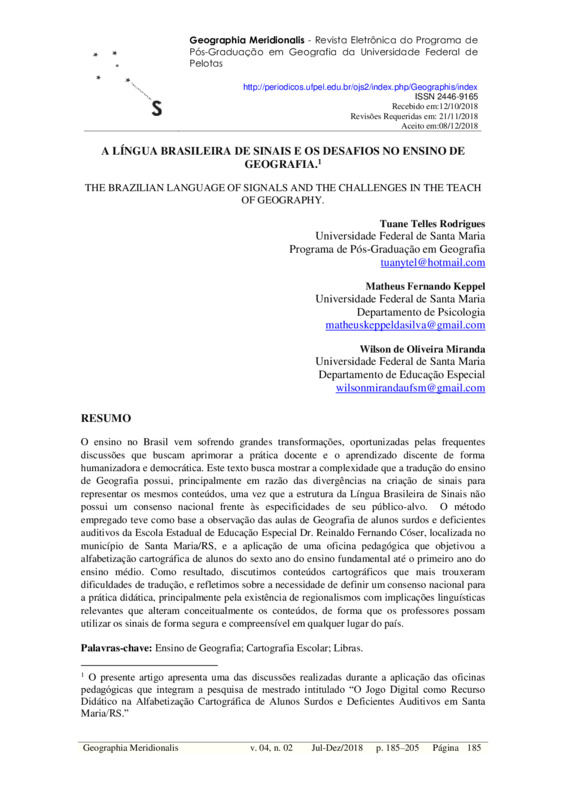A LÍNGUA BRASILEIRA DE SINAIS E OS DESAFIOS NO ENSINO DE GEOGRAFIA / THE BRAZILIAN LANGUAGE OF SIGNALS AND THE CHALLENGES IN THE TEACH OF GEOGRAPHY
Item
-
Título
-
A LÍNGUA BRASILEIRA DE SINAIS E OS DESAFIOS NO ENSINO DE GEOGRAFIA / THE BRAZILIAN LANGUAGE OF SIGNALS AND THE CHALLENGES IN THE TEACH OF GEOGRAPHY
-
Geographia Meridionalis
-
UFSM
-
UFSM
-
Description
-
UFSM
-
Autor
-
Tuane Telles Rodrigues
-
Matheus Fernando Keppel
-
Wilson de Oliveira Miranda
-
Assunto
-
Cartografia Escolar
-
Ensino de Geografia
-
Libras
-
Abstract
-
O ensino no Brasil vem sofrendo grandes transformações, oportunizadas pelas frequentes discussões que buscam aprimorar a prática docente e o aprendizado discente de forma humanizadora e democrática. Este texto busca mostrar a complexidade que a tradução do ensino de Geografia possui, principalmente em razão das divergências na criação de sinais para representar os mesmos conteúdos, uma vez que a estrutura da Língua Brasileira de Sinais não possui um consenso nacional frente às especificidades de seu público-alvo. O método empregado teve como base a observação das aulas de Geografia de alunos surdos e deficientes auditivos da Escola Estadual de Educação Especial Dr. Reinaldo Fernando Cóser, localizada no município de Santa Maria/RS, e a aplicação de uma oficina pedagógica que objetivou a alfabetização cartográfica de alunos do sexto ano do ensino fundamental até o primeiro ano do ensino médio. Como resultado, discutimos conteúdos cartográficos que mais trouxeram dificuldades de tradução, e refletimos sobre a necessidade de definir um consenso nacional para a prática didática, principalmente pela existência de regionalismos com implicações linguísticas relevantes que alteram conceitualmente os conteúdos, de forma que os professores possam utilizar os sinais de forma segura e compreensível em qualquer lugar do país.ABSTRACTThe teaching in Brazil has been undergoing great transformations, opportunized by the frequent discussions that seek to improve teaching practice and student learning in a humanizing and democratic way. This text seeks to show the complexity that the translation of Geography teaching has, mainly due to the differences in the creation of signals to represent the same contents, since the structure of the Brazilian Sign Language does not have a national consensus regarding the specificities of its target Audience. The method used was based on the observation of the Geography classes of deaf and hearing impaired students of the State School of Special Education Dr. Reinaldo Fernando Cóser, located in the city of Santa Maria / RS, and the application of a pedagogical workshop that aimed at literacy cartographic study of students from the sixth year of elementary school to the first year of high school. As a result, we discuss cartographic contents that have brought more difficulties for translation, and we reflect on the need to define a national consensus for didactic practice, mainly by the existence of regionalisms with relevant linguistic implications that conceptually alter the contents, so that teachers can use the signals in a safe way and understandable anywhere in the country.Keywords: Geography Teaching; School Cartography; Libras.
-
volume
-
4
-
issue
-
2
-
Páginas
-
185-205
-
Date
-
2018
-
Língua
-
pt
-
doi
-
10.15210/gm.v4i2.14474
-
issn
-
2446-9165
-
Rights
-
Direitos autorais 2018 Geographia Meridionalis


